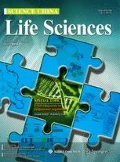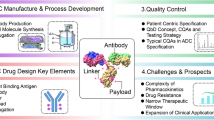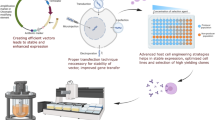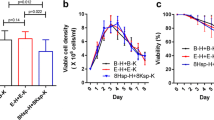Abstract
Using antibody phage display technique, a human single chain antibody to vascular endothelial growth factor (VEGF) has been cloned. The antibody expression reached 45% of the total bacterial proteins. The purification and refolding of the antibody were completed in one step by using gel filtration chromatograph. ELISA analysis showed that the antibody not only specifically bound to human VEGF, but also competitively inhibited VEGF reacting with its receptors. In order to raise the affinity of the single chain antibody, its heavy chain variable region was randomly mutated using error-prone PCR and an antibody mutant library was constructed, from which a mutant with higher affinity was screened out. The three-dimensional structure and binding affinity of wild type and mutant antibody were compared. Our study provided a potential reagent for tumor angiogenic therapy and a significant model for antibody high-level expression and affinity maturation.
Similar content being viewed by others
References
Barinaga, M., Designing therapies that target tumor blood vessels, Science, 1997, 275: 482.
Li, J. S., Yan, X.Y., Antibody based tumor angiogenic therapy, Chinese Science Bulletin, 1997, 42:2031.
Robert, S. K., A cancer therapy resistant to resistance, Nature, 1997, 390(27): 335.
Brown, L. F., Detmarm, K., Claffey, K. et al., Vascular permeability factor/vascular endothelial growth factor: a multifunctional angiogenic cytokine, in Regulation of Angiogenesis (eds. Goldberg, J. D., Rosen, E. M.), Basel: Birkhauser Verlag, 1997, 233–269.
Kim, K. J., Li, B., Winer, J. et al., Inhibition of vascular endothelial growth factor-induced angiogenesis suppresses tumor growthin vivo, Nature, 1993, 362: 841.
Thorpe, P., Antibody-directed targeting of tumor vasculature, Proc. Am. Assoc. Cancer. Res., 1996, 37: 688.
Presta, L. G., Chen, H., O’Connor, S. J. et al., Humanization of an anti-vascular endothelial growth factor monoclonal antibody for the therapy of solid tumors and the disorders, Cancer Research, 1997, 57:4593.
Nissim, A., Hoogenboom, H. R., Tomlinson, I. M. et al., Antibody fragments from a single pot phage display library as immunochemical reagents, EMBO J., 1994, 13: 692.
Tang, J., Yan, X. Y., Liu, Y. Y. et al., Production and characterization of a human single-chain Fv to collagenase IV, Science in China, Ser. C, 1998, 41(4): 387.
Cohen, T. H., Gitay-Goren, R., Sharon, M. et al., VEGF121, a vascular endothelial growth factor isoform lacking binding ability, requires cell surface heparan sulfates for efficient binding to the VEGF receptors of human melanoma cells, J. Biol. Chem., 1995, 270: 11322.
Tomlinson, I. M., Walter, G., Marks, J. D. et al., The repertoire of human germline VH sequences reveals about fifty groups of VH segments with different hypervariable loops, J. Mol. Biol., 1992, 227: 776.
Yan, X. Y., Evans, S. V., Kaminki, M. J. et al., Characterization of an Ig VH epitope that results in specific homophilic binding and increased avidity for antigen, J. Immunology, 1996, 157(4): 1582.
Author information
Authors and Affiliations
Corresponding author
Rights and permissions
About this article
Cite this article
Yan, X., Tang, J., Wu, X. et al. Human single chain antibody to vascular endothelial growth factor: gene cloning, high-level expression, affinity maturation and bioactivity. Sci. China Ser. C.-Life Sci. 43, 232–238 (2000). https://doi.org/10.1007/BF02879281
Received:
Issue Date:
DOI: https://doi.org/10.1007/BF02879281




